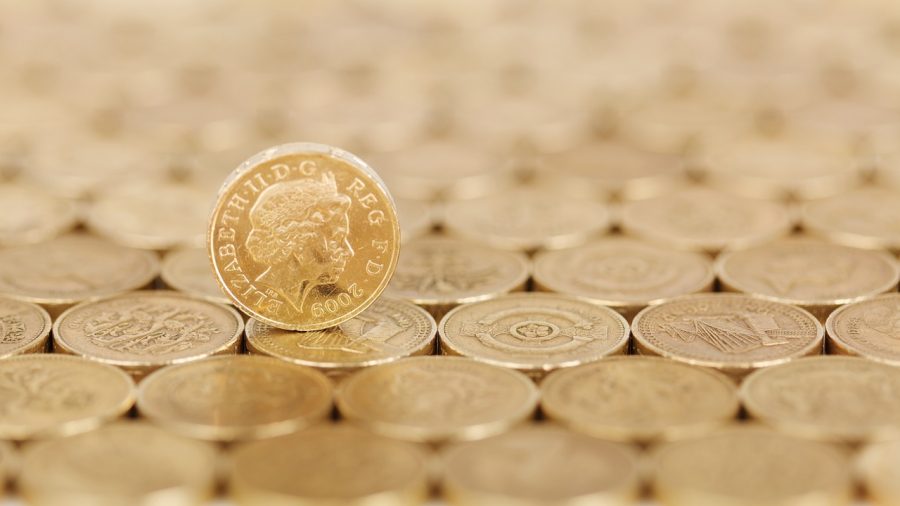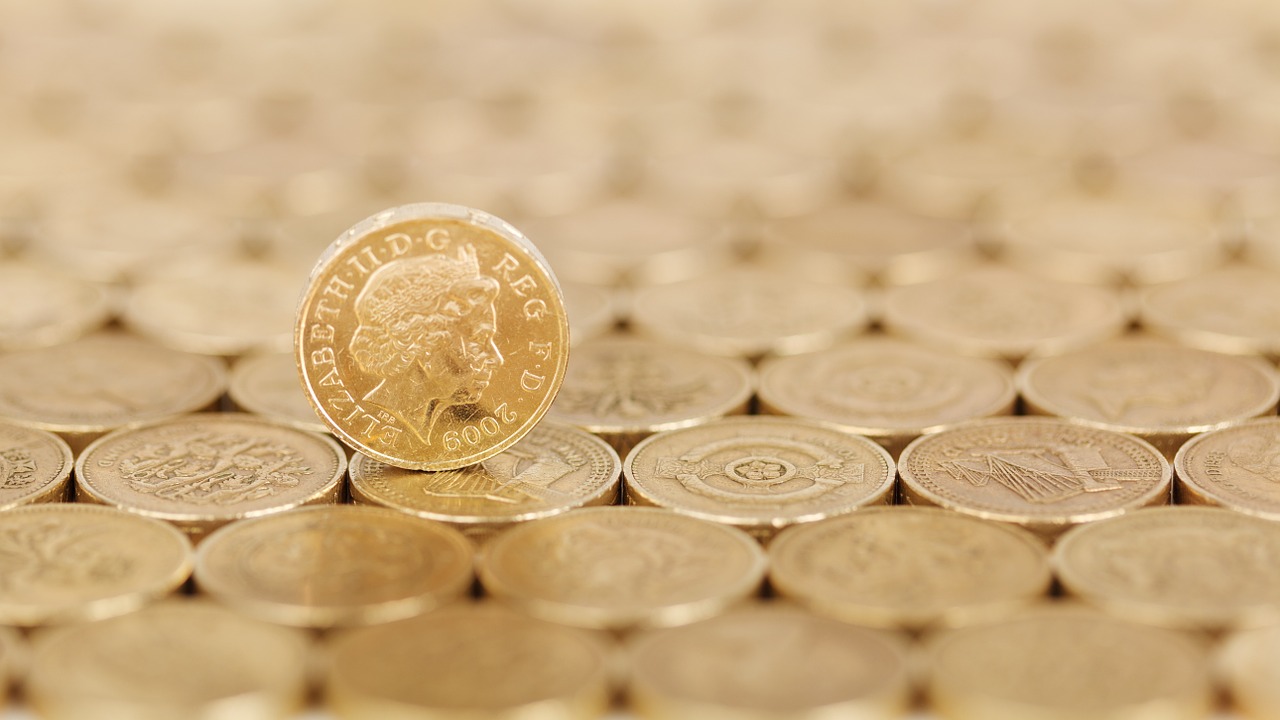
Pound edged up as grim data not as bad as euro zone survey
The pound edged up against the euro, shaking off data that showed the UK labour market lost more steam in August.

Reuters: The pound edged up against the euro on Tuesday, shaking off data that showed the UK labour market lost more steam in August and business activity deteriorated this month as an economic survey for the euro zone was even worse.
BRITISH POUND STERLING EDGED UP
Britain’s unemployment rate held steady at 4.2% under a new calculation that accounts for dwindling survey responses from households, while the number of employed people fell by 82,000 and the number unemployed rose by 74,000. Sterling was last up 0.24% against the euro at 86.90 pence and flat against the dollar at $1.2247.
A separate survey showed Britain’s businesses reported another decline in activity this month and cost pressures have cooled further, underlining the risk of recession ahead of the Bank of England’s interest rate decision next week. The “flash” preliminary reading of the S&P Global UK Purchasing Managers’ Index for the services sector fell in October to 49.2 from 49.3 in September, the lowest reading since January and below the 50 no-change mark for a third month. A Reuters poll of economists had pointed to an unchanged reading. A PMI for the euro zone was worse, showing business activity in the bloc took a surprise turn for the worse this month.
Money markets show traders believe UK rates have now peaked at 5.25% and could realistically start to decline by around June. Just three months ago, traders were preparing for a peak of 5.8% by May 2024 and the prospect of the first decline by September. Since then, inflation has declined to 6.7%, from 7.9%, while growth has struggled to show any year-on-year increase. “It’s hard to believe that sticky inflation and higher interest rates won’t have more impact on the surprisingly robust economy. Focus is now all on the upcoming round of central bank policy decisions,” Neil Birrell, chief investment officer at Premier Miton, said in a note.
ALSO READ: Fuel price UPDATE: Petrol, diesel news still GOOD for November
U.S. DOLLAR
Reuters: The dollar was on the front foot on Wednesday, drawing support from yet another resilient U.S. economic data reading, while the euro struggled to make headway on the back of a darkening growth outlook in the bloc. The Australian dollar rose more than 0.5% in an initial knee-jerk reaction following a higher-than-expected inflation print in Australia on Wednesday. U.S. business output ticked higher in October as the manufacturing sector pulled out of a five-month contraction, data on Tuesday showed, while separate data released the same day showed the euro zone’s business activity in contrast took a surprise turn for the worse this month.
Against the dollar, the euro was last 0.05% higher at $1.0595, having declined 0.75% on Tuesday. The single currency’s slide lifted the dollar index and it last steadied at 106.23, away from a one-month low of 105.35 hit in the previous session. The euro is the most heavily weighted currency in the dollar index, which measures the greenback against a basket of six peers. “The euro zone economy is kind of entering a recession, so this economic playout stiffens expectations that the European Central Bank might have reached a peak in interest rates,” said Tina Teng, market analyst at CMC Markets. “By contrast, the U.S. Federal Reserve could continue to raise interest rates just because the economic data looks strong.”
The buoyant dollar kept the yen pinned near the closely watched 150 threshold, with the Japanese currency last at 149.86 per dollar, having mostly traded sideways over the past month and keeping traders on their toes for any signs of intervention by Japanese authorities. Pressure is mounting on the Bank of Japan to change its bond yield control as global interest rates rise. A hike to an existing yield cap set just three months ago is being discussed as a possibility in the run up to next week’s policy meeting, sources said earlier this week.
Elsewhere, sterling rose 0.04% to $1.2165, while the New Zealand dollar gained 0.08% to $0.5849. The Australian dollar was last 0.35% higher at $0.6378. “The Reserve Bank of Australia’s November meeting is likely to be live, and the cash rate to be hiked to 4.35%. And I suspect it will be a hawkish hike,” said Matt Simpson, senior market analyst at City Index. In cryptocurrencies, Bitcoin was last 0.28% lower at $33,822, holding near a roughly 18-month high hit on Tuesday.
ALSO READ: Who is the richest person in the world today? Top 10 list – 25 October 2023
The world’s largest cryptocurrency has been on a tear this week, having surged 10% on Monday, fuelled by mounting speculation that an exchange-traded bitcoin fund is imminent. “A growing spot ETF market would invariably mean a growing market across most of the cryptocurrency landscape,” said John Glover, chief investment officer at crypto lender Ledn. “If Bitcoin is being purchased for ETFs, the price will rise there is a very real possibility that the launch of one or more spot ETFs could lead to the next major bull run in the entire cryptocurrency ecosystem.”
SOUTH AFRICAN RAND
Reuters: South Africa’s rand fell on Tuesday as the dollar strengthened following fresh economic data, which highlighted the strength of the U.S. economy. At 1546 GMT, the rand traded at 19.0600 against the dollar, around 0.5% weaker than its previous close. The dollar was up more than 0.6% against a basket of global currencies. U.S. data showed business output ticked higher in October as the manufacturing sector pulled out of a five-month contraction.
ALSO READ: Supermarket price watch: The cheapest groceries this week
Shares on the Johannesburg Stock Exchange rose, with the blue-chip Top-40 index closing about 0.8% higher. South Africa’s benchmark 2030 government bond was stronger, the yield down 15 basis points to 10.675%.
ALSO READ: Bridge: Bill Gates’ favourite card game
GLOBAL MARKETS
Reuters: China led Asia’s stock markets higher on Wednesday as investors cheered the approval of a trillion-yuan sovereign bond issue as a harbinger of stimulus, while the Aussie dollar hit a two-week high as hotter-than-expected inflation lifted rate forecasts. MSCI’s broadest index of Asia-Pacific shares outside Japan rose 0.9% and the Hang Seng 2%. Japan’s Nikkei rose 1.1%. Bonds have held onto a bounce-back after the 10-year Treasury yield breached 5% on Monday, with the benchmark yield firm at 4.82% in Tokyo trade. Overnight solid earnings and U.S. economic data lifted Wall Street indexes, while oil and the euro had dropped on weaker-than-forecast purchasing managers surveys on the continent. U.S. and European stock futures were steady in early Asia trade.
China’s top parliament approved a 1 trillion yuan ($137 billion) bond issue, state media reported adding the funds would be spent rebuilding disaster zones and improving infrastructure. Also helping the mood was state-owned investment company Central Huijin announcing it was buying exchange-traded funds, a move which has sparked strong rallies in the past. “Government expenditure will help the economy to stabilise further and strengthen growth in the fourth quarter,” said Steven Leung, executive director of institutional sales at broker UOB Kay Hian in Hong Kong.
Central Huijin promising ETF purchases drove rallies of more than 20% in 2013 and 2015, according to UOB, and Leung said the signal had given a strong boost to sentiment. In currency markets, the euro made its steepest drop for two weeks overnight, falling 0.7% after the euro zone composite PMI fell deeper into contractionary territory to its lowest in three years. Investors pulled forward European rate cut expectations a little and the euro was nursing losses at $1.0594.
ALSO READ: Newspaper front pages from around the world, 25 October 2023
The yen was pinned at 149.85 and the Australian dollar was the standout gainer, rising 0.6% to a two-week high of $0.64. The annual pace of inflation in Australia slowed in the third quarter, but at 5.4% was above forecasts of 5.3%. Pricing for the odds on a rate hike next month shot to 60% from 35% before the data. “Given the hawkish rhetoric from the RBA over the past two weeks and an uncomfortably high Q3 CPI outcome, we now expect the RBA to increase the cash rate by 25bp in November to 4.35%,” ANZ analysts said in a note.
Oil fell in commodity trade on Tuesday, thanks to the weak economic data from Europe, and was nursing losses on Wednesday. Brent crude futures were steady at $88.13 a barrel, unwinding gains made in the wake of conflict in the Middle East. “I think commodity markets are recalibrating the geopolitical implications in the Middle East more decisive drivers are needed for a clear direction,” said Glenn Yin, head of research at AETOS Capital Group in Melbourne. The United States and Russia were among several nations pushing for a pause in fighting between Israel and Hamas to allow aid into the besieged Gaza Strip.
After touching $1,997 an ounce last week, spot gold traded at $1,973. Bitcoin, meanwhile, seems to have awoken from long hibernation during the so-called “winter” that followed numerous scandals including the collapse of exchange FTX. It’s up 15% this week mostly thanks to speculation that exchange-traded fund applications from BlackRock and others will succeed and drive capital into the asset class. Bitcoin last bought $34,340. The U.S. Securities and Exchange Commission has declined to comment on the speculation.
ALSO READ: City of Cape Town organises public viewing areas for Rugby World Cup final
Published by the Mercury Team on 25 October 2023
For more news on global and local market performance, follow our business and finance page.
